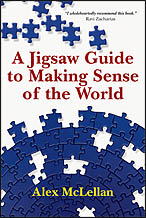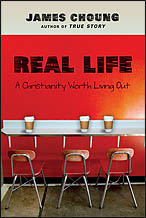
“If you identify yourself as a Christian, you may get stuck with a label that describes you as harsh and offensive and when you try to stand up for your faith you will be told to sit down. It can come as a shock that people find your belief so corrosive, but the source of the problem is the cornerstone of Christian faith: you claim to know the truth. To say your understanding of the world is absolutely true means you believe you are right and everyone who disagrees with you is wrong. This is currently viewed as the ultimate statement of arrogance. People are permitted to say they know what is true for them, but no one dare say they know what is true for everyone.” — Alex McLellan. A Jigsaw Guide to Making Sense of the World. Downers Grove, IL: InterVarsity Press, 2013, 54-55.
Discussion question from the end of Chapter 2: “Have you encountered people who are uncomfortable with anyone claiming to know the truth? If so, how could you help steer them in the right direction?” (53)
Much to commend itself in Chapter 2: Be Prepared to Handle It. The above quote came to mind in relationship to Mike’s recent post How Should Students Respond to Anti-Christian Professors? (2/5/2013). As you may remember, I touch on some of my approach of trying to ask good questions, to practice the art of listening, and to answer questions asked of me with clarity/openness in A Jigsaw Guide to Making Sense of the World II. The word I failed to mention was humility — not just in presentation, but acknowledging one doesn’t know it all. Let us be sure to gently offer that we’re also growing and learning in our understanding, i.e., invite others to join us in growing closer to the true and living God who speaks to us through all of creation.

A little bit more . . . Spurred by the Urbana Books of the Day Discussion‘s exploration of “each generations’ spiritual question of the day” (James Choung. “Real Life: A Christianity Worth Living Out.” InterVarsity Press, 2012), I’ve once again been reflecting the relationship of
- “What is true?” (Boomers)
- “What is real?” (X-ers)
- “What is good?” (Millenials)
- “What makes beautiful?” (Millenials)
Thank-you to Joe for sharing that he considers all generations seeking “What makes beautiful?” and offering Phil Wickham’s “You’re Beautiful” as a sample.
http://www.youtube.com/watch?v=QGlTzH9xkXQ
So a second question, “How do you see (understand, articulate) the relationship of what is true, real, good, and beautiful?”
Click here for all the quotes ESN has posted from A Jigsaw Guide to Making Sense of the World.
Tom enjoys daily conversations regarding living out the Biblical Story with his wife Theresa and their four girls, around the block, at Elizabethtown Brethren in Christ Church (where he teaches adult electives and co-leads a small group), among healthcare professionals as the Northeast Regional Director for the Christian Medical & Dental Associations (CMDA), and in higher ed as a volunteer with the Emerging Scholars Network (ESN). For a number of years, the Christian Medical Society / CMDA at Penn State College of Medicine was the hub of his ministry with CMDA. Note: Tom served with InterVarsity Christian Fellowship / USA for 20+ years, including 6+ years as the Associate Director of ESN. He has written for the ESN blog from its launch in August 2008. He has studied Biology (B.S.), Higher Education (M.A.), Spiritual Direction (Certificate), Spiritual Formation (M.A.R.), Ministry to Emerging Generations (D.Min.). To God be the glory!

Leave a Reply